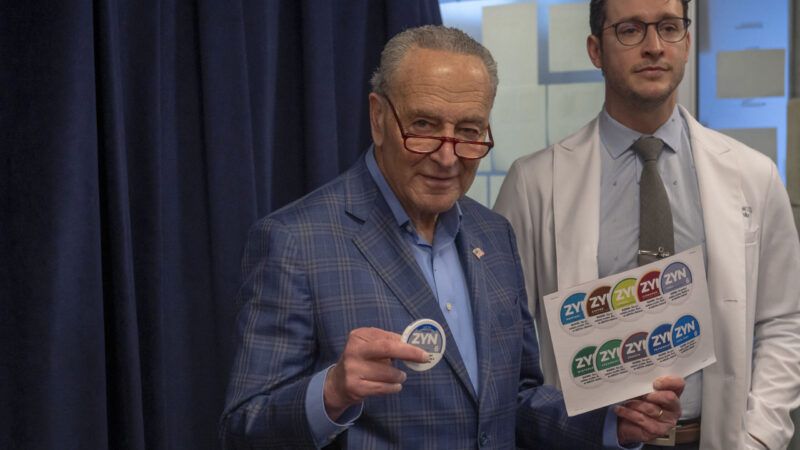Chuck Schumer Attacks Lifesaving Zyn Nicotine Pouches
Zyn pouches are a dramatically safer alternative to smoking.

Less than three months after launching an attack on energy drinks, Senate Majority Leader Chuck Schumer (D–N.Y.) has a new target: Zyn nicotine pouches.
In a press release Sunday, Schumer labeled Zyn a "quiet and dangerous" alternative to vaping, claiming that with the decline in smoking, tobacco companies are adapting by focusing on new products like oral nicotine. Zyns are small pouches of nicotine meant to be placed between the lips and gums. Two strengths of the product are available at three and six milligrams of nicotine, and they come in several flavors.
Schumer's ire appears to have been raised by the rapid growth in sales of nicotine pouches and so-called "Zynfluecers" on TikTok promoting the product. Schumer fears nicotine pouches could become a teen trend, as vaping did in 2019 before rapidly declining as the tobacco age was raised to 21 and schools became more aware of the problem. To head off a potential increase in youth nicotine addiction, Schumer wants the Federal Trade Commission and the Food and Drug Administration to investigate the marketing of Zyn and potentially restrict their flavors.
But Schumer's framing has the story backward. Zyn is not a dangerous alternative to vaping but a dramatically safer alternative to smoking. One of the reasons smoking has declined substantially over the last decade is because safer nicotine alternatives like vapes and Zyn are switching smokers away from cigarettes. The closest equivalent for which we have decades of data is an oral smokeless tobacco called snus. Snus is most prevalent in Sweden, and not coincidentally, Sweden has the lowest smoking and lung cancer rates in Europe because those interested in using nicotine do so in a much safer form.
Schumer is right that nicotine pouches are enjoying enormous sales, but he would be wrong to assume nicotine-naive youth are driving these sales. According to the National Youth Tobacco Survey, only 1.5 percent of middle and high schoolers use nicotine pouches, and just 2.3 percent have ever tried a nicotine pouch. Even among the minority of young people who use products like Zyn, most are not nicotine newbies. A study of adolescents and adults aged 15-24 who used nicotine pouches found the vast majority were smokers or had smoked cigarettes in the past at 73 percent and 81 percent, respectively. Just like with e-cigarettes, nicotine pouches disproportionately appeal to people who are already using nicotine most often in its most dangerous form, which is cigarettes.
Schumer's concern that Zyn comes in several flavors like cinnamon and citrus is also misguided. For one, Zyn has already applied to the FDA to be authorized for sale, and the agency will determine whether it presents a net benefit to public health. But suppose flavors in nicotine products are inherently youth-appealing, as Schumer suggests. In that case, he should be just as outraged that nicotine gums, which have been around for decades, are sold in flavors like "cinnamon surge," "fruit chill," and "spearmint burst." Nicotine flavor bans have a poor track record in improving public health, with bans on flavored vapes associated with an increase in cigarette sales.
Schumer's intervention drew mockery on X (formerly known as Twitter), including from Republican lawmakers and conservative commentators defending Zyn. The reaction is perhaps unsurprising, given that Tucker Carlson is the most famous Zyn consumer.
The most worrying aspect of Schumer's demonization of Zyn is that it contributes to the false impression that just because something contains nicotine, it's a threat to public health. What makes cigarettes so lethal is not nicotine but setting tobacco on fire and inhaling the smoke.
Divorced from smoke, nicotine is a relatively benign stimulant with a similar risk profile to caffeine. Most adults incorrectly believe vaping is just as bad or worse than smoking. If these misperceptions were replicated for products like Zyn, the most likely effect would not be saving kids from the grips of nicotine addiction, as Schumer hopes, but to keep smokers smoking. Dr. Jeffrey A. Singer of the Cato Institute lamented the constant fearmongering around nicotine, writing, "I can only think of one explanation: an unfounded and irrational fear of nicotine. I call it nicotinophobia."


Show Comments (29)